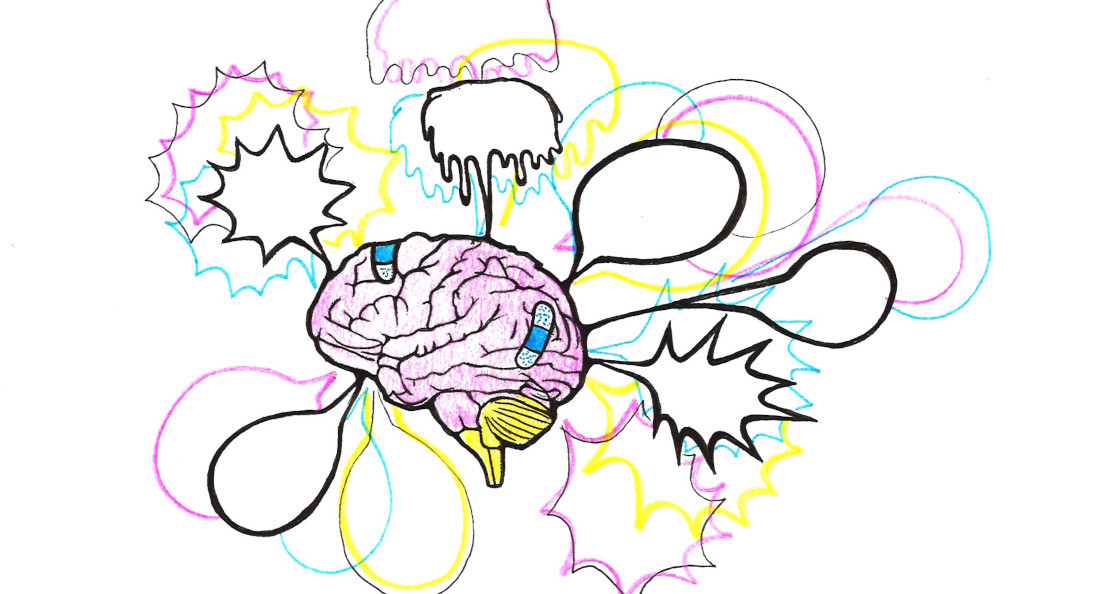‘Conversations about stigma’ are all talk
Enough platitudes about mental health. Let’s actually discuss mental illness.

Illustrated by Gabrielle Funk
In mid-September, Winnipeg-born singer-songwriter Chantal Kreviazuk spoke to multiple media outlets about “ending the stigma around talking about mental health.” As Kreviazuk told CTV News Winnipeg, “I’ve always believed we’re only as strong as the person who’s having the most challenging time in our immediate family, in our community. So, I think it’s okay to talk about our mental health.”
While Kreviazuk’s work with mental-health organizations certainly deserves praise, I couldn’t help but sigh and roll my eyes when I heard that phrase. As a mentally ill person, I have grown so tired of hearing about “conversations” and “stigma.”
A prominent example of this is Bell’s annual Let’s Talk campaign, which encourages everyone to “talk” about, and remove the stigma around, mental illness. Bell’s campaign has been the subject of criticism over the exploitative corporation’s own hypocrisy regarding treatment of workers and prison profiteering. But there’s a deeper problem in framing every discussion around “conversations” and “stigma.”
When I first entered treatment for major depressive disorder at age 19, I made an effort to talk about it publicly. I was aware of the stigma around it. The only person I’d heard speak openly about mental illness was Carrie Fisher. I wanted my friends to know I’d answer any question they had.
Twelve years later, I’ve grown more private about my depression. It feels less imperative as society learns more about mood disorders like depression and bipolar. Truthfully, it’s been years since I’ve felt judged or stigmatized for my illness. We’ve made real progress. But instead of moving on to the next step, we keep banging the same drum.
The continued narrative of “destigmatizing conversations about mental illness” doesn’t really address mental illness at all. We’re adding a buffer layer (conversations) to another buffer layer (stigma). What we’re really addressing is so-called “neurotypical” people’s discomfort or prejudice regarding mental illness. I am done catering to those people. Maybe a decade ago, educating them was the right project. But if they aren’t on board by now, that’s their problem.
No, I don’t want to talk about attitudes toward mental illness anymore. I don’t need to hear people without a diagnosed mental illness tell me, “I think it’s okay that you’re sad!” I want to actually talk about illness, access to therapy, treatment and medication.
Let’s talk about how accessing therapy and medication is still expensive and difficult for many. My last attempt to access therapy, even with the privilege of employer-based healthcare, went nowhere. Folks without coverage of any kind face their own unique hurdles. All treatment should be free and easy to access for everyone, period.
Let’s acknowledge that mental illness doesn’t just mean mood disorders like depression. It also means eating disorders (in Manitoba, waitlists for treatment can be up to two years). It means schizophrenia and other psychosis-inducing disorders.
On Sept. 17, Manitoba Progressive Conservative leadership candidate Shelly Glover told CBC News that she believes Vince Li, who was found not criminally responsible for an infamous 2008 killing on a Greyhound bus in Portage la Prairie, should remain locked up despite the fact that his schizophrenia has been treated, and he poses no risk to the public.
Let’s stop having the easy, placating conversations. Let’s take meaningful action and start talking about the hard stuff.
Thomas Pashko is the managing editor for The Uniter and lives unabashedly with major depressive disorder. He had to have his daily dose of sertraline increased during the pandemic, and he should probably start doing mindfulness meditation again.
Published in Volume 76, Number 4 of The Uniter (October 1, 2021)







